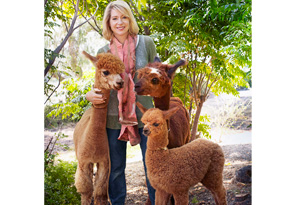How They Discovered Their Dream Careers

Photo: Coral Von Zumwalt
PAGE 7
Beth Osborne left her first-grade classroom for greener pastures.
On a sweltering morning in Southern California, Beth Osborne ascends a scrubby, golden-brown hilltop with panoramic views and cautiously approaches a skittish white alpaca—one of dozens chomping grass nearby and registering her approach with mild interest. Osborne leads the reluctant beast toward a few females, where his presence will serve as a low-tech pregnancy test. "When female alpacas catch sight of their impregnator," Osborne explains casually, "they spit."Osborne didn't always oversee the mating habits of 63 curious—and occasionally unruly—small ruminants. For more than a decade, she led sing-alongs and taught math with building blocks. But while she loved her first-graders, her school was increasingly obsessed with standardized tests. "It felt as though we were just teaching the kids how to fill in bubbles on exams," she says.
That's when a magazine story about alpaca farming caught her eye. With their scrunchy faces and inquisitive gaze, the alpacas—South American relatives of the llama—were adorable, and sounded like a great investment. Their fiber, uncannily warm and soft, commands a small fortune (an alpaca sweater can cost hundreds of dollars). Could these goofy-looking creatures be the career change she was looking for? "I'd never even raised kittens," says Osborne, "but I became obsessed with alpacas."
Over the next year she took farming classes and attended "shearing days" and auctions. Then in 2005 Osborne's husband bought her a young male alpaca named Crown Royal (his previous owner said he'd once slurped a mixed drink at a wedding). The beast's caramel fur was gorgeous, and his smile disarming—but the couple had nowhere to keep him. So they found a breathtaking three-acre spread nearby and christened it the Alpaca Hacienda. By this time Osborne had quit her job; she now earns the equivalent of her teaching salary selling hand-spun yarn online (along with boarding and breeding services). She also still interacts with kids—when they come to the ranch to learn about her herd. "I feel so fortunate to fill my days with these gentle animals," she says. "What can I say? I'm having the time of my life." —Aaron Rowe
Next: From housekeeper to eco-activist...



